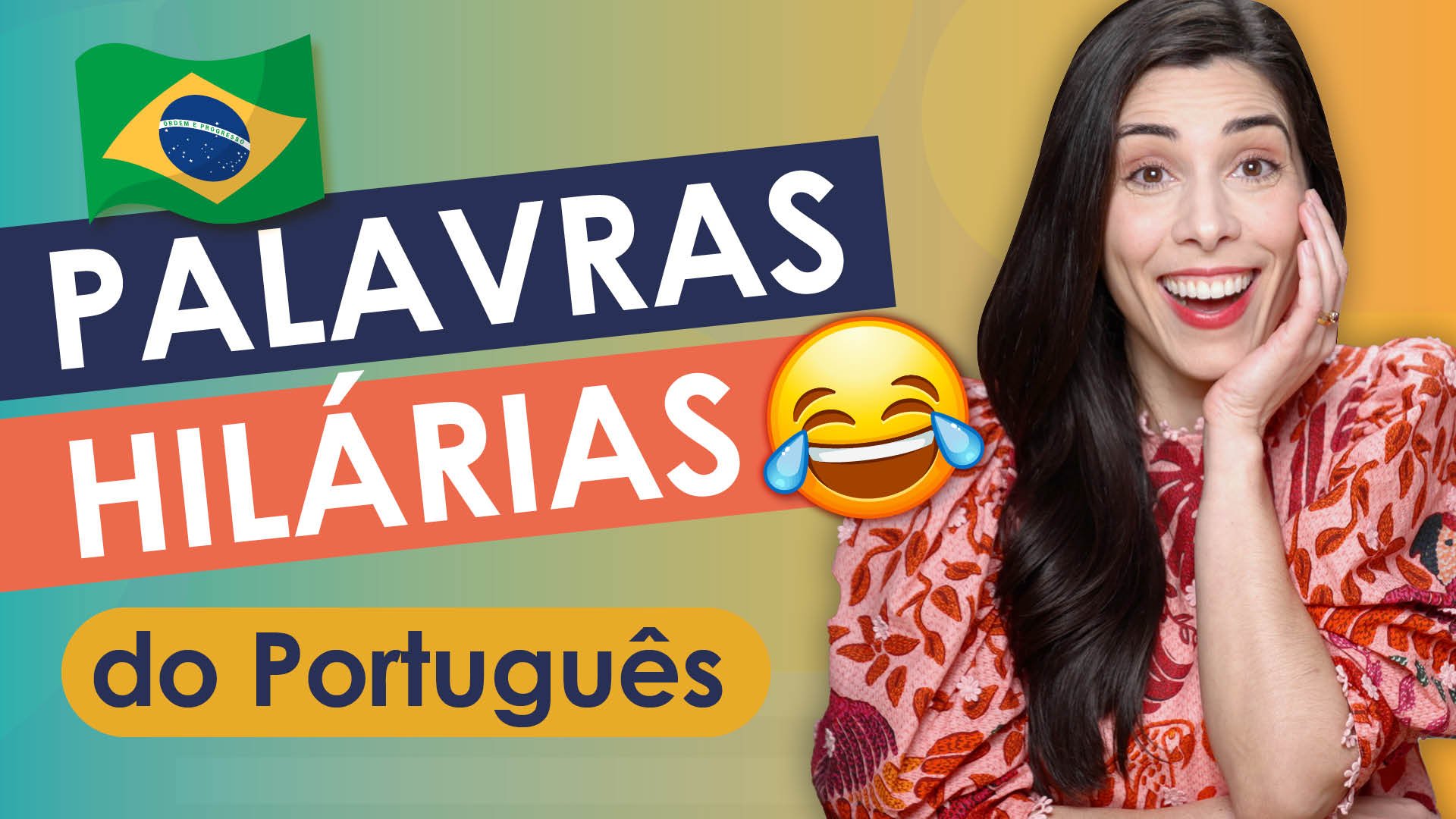*Read translation into English at the end 🙂
Transcription of the video:
Números em português 0-100
Oi pessoal! Aqui é a Virginia.
Hoje, você vai aprender a contar de 0 a 100 em português. Continue assistindo!
Minicurso de Pronúncia
Se você é novo em meu canal, eu gostaria que você soubesse que eu ofereço um minicurso de pronúncia gratuito que já ajudou milhares de pessoas em todo o mundo a melhorar a pronúncia no português brasileiro. Para se inscrever, visite o meu site: school.speakingbrazilian.com
Se você gosta dos meus vídeos, não esqueça de se inscrever em meu canal para receber notificações sempre que eu publicar um novo vídeo.
Agora, vamos começar nossa lição.
Como contar de 0 a 100
Eu preparei duas lições sobre números em português. Na primeira lição, você vai aprender a contar de 0 a 100 e na segunda lição, que será publicada na próxima semana, você vai aprender a contar de 101 a 1 bilhão.
Não é difícil usar números em português. Você precisa apenas memorizar os números principais, que são as unidades, as dezenas, as centenas e os milhares, e depois vamos apenas conectar as palavras.
Unidades
Vamos começar contando de 0 a 20. Repita depois de mim para praticar sua pronúncia:
0. Zero
1. Um
2. Dois
3. Três
4. Quatro
5. Cinco
6. Seis
7. Sete
8. Oito
9. Nove
10. Dez
11. Onze
12. Doze
13. Treze
14. Quatorze
15. Quinze
16. Dezesseis
17. Dezessete
18. Dezoito
19. Dezenove
20. Vinte
Muito bem!
Dezenas
Agora, vamos estudar apenas as dezenas, de 10 a 100. Repita depois de mim para praticar sua pronúncia:
10. Dez
20. Vinte
30. Trinta
40. Quarenta
50. Cinquenta
60. Sessenta
70. Setenta
80. Oitenta
90. Noventa
100. Cem ou Cento
Muito bem!
Vamos praticar!
Agora que você já sabe as unidades e as dezenas, é muito fácil saber como dizer os números em português, pois você vai apenas conectar as palavras.
Por exemplo, como você diria este número em português?
125 – cento e vinte e cinco
Você pode dizer simplesmente, um, dois, cinco. Ou, cento e vinte e cinco.
Conectando os números
Nós sempre devemos usar a conjunção “e” para conectar os números entre as dezenas e unidades e entre as centenas e dezenas.
125 – Cento E vinte E cinco.
Cem ou Cento?
E por que eu disse “cento” e não “cem”?
Nós usamos a palavra “cem” apenas para nos referir ao número 100. A partir do número cento e um, usamos sempre a palavra “cento”.
101 – Cento e um
102 – Cento e dois
E assim por diante.
Seis ou Meia?
Vamos fazer mais um exercício. Como você diria este número de telefone?
202-555-0165 – Dois, zero, dois, cinco, cinco, cinco, zero, um, meia, cinco.
Você deve estar se perguntando por que eu disse “meia” e não “seis”.
A palavra “meia” é a redução de “meia dúzia”. No Brasil, é muito comum usarmos a palavra “meia” no lugar do número “seis” em linguagem coloquial.
Usamos a palavra “meia” quando estamos dizendo uma sequência de números individuais, como por exemplo um número de telefone, ou um endereço, ou a placa de um carro.
Por exemplo:
– O telefone da Maria é 969-635-6656.
– A placa do meu carro é XYZ-6263.
– João mora na Alameda Jaú, número 2636.
Mas preste atenção. Nem sempre podemos usar a palavra “meia” no lugar do número “seis”. Não usamos a palavra “meia” para dizer idade, data, ou para contar a quantidade de alguma coisa.
Por exemplo:
– Pedrinho tem 6 anos.
– O aniversário do Pedrinho é no dia 6 de junho.
– Eu tenho 6 canetas.
Números têm gênero?
Agora vamos falar sobre gênero dos números. Números têm gênero? Depende.
Como você responderia esta pergunta?
Quantas canetas eu tenho em minha mão?
– Eu tenho duas canetas.
Por que eu disse “duas” e não “dois”? Porque os números 1 e 2 variam em gênero e precisam concordar com o gênero do substantivo a que se referem.
Quase sempre usamos o número masculino. Um e dois. Você vai usar o número feminino apenas quando estiver se referindo diretamente a um substantivo feminino.
Por exemplo:
– Um livro
– Uma caneta
– Dois livros
– Duas canetas
Apenas os números 1 e 2 variam em gênero. Os outros números não variam. As centenas a partir do número duzentos também variam, mas nós vamos falar sobre as centenas apenas no próximo vídeo.
É isso, pessoal! Agora você já sabe como contar de zero a cem em português.
Agora é hora do dever de casa!
Eu vou colocar quatro números aqui na tela e eu quero que você escreva um comentário abaixo dizendo como você diria estes números em português. No dever de casa, eu quero que você escreva o número por completo para praticar, tá bem?
Estes são os números do dever de casa: (166) (53) (82) (131)
Se você gostou deste vídeo, lembre-se de dar um like e de se inscrever em meu canal! Todas as semanas, eu posto um novo vídeo com dicas de gramática, expressões e pronúncia do português brasileiro.
Até a próxima! Tchau, tchau!
Numbers in Portuguese 0-100
Hi everyone! Virginia here.
Today, you’ll learn to count from 0 to 100 in Portuguese. Keep watching!
Mini-course in Pronunciation
If you’re new to my channel, I’d like you to know that I offer a free mini-course in pronunciation that has helped thousands of people around the world improve their pronunciation of Brazilian Portuguese. To sign up, visit my website: school.speakingbrazilian.com
If you like my videos, don’t forget to subscribe to my channel to receive notifications whenever I publish a new video.
Now, let’s begin our lesson.
How to count from 0 to 100
I prepared two lessons about numbers in Portuguese. In the first lesson, you’ll learn to count from 0 to 100 and in the second lesson, which will be published next week, you’ll learn to count from 101 to 1 billion.
It’s not difficult to use numbers in Portuguese. You just need to memorize the main numbers, which are the units, the tens, the hundreds and the thousands, and then we’ll just connect the words.
Units
Let’s start by counting from 0 to 20. Repeat after me to practice your pronunciation:
0. Zero (Zero)
1. Um (One)
2. Dois (Two)
3. Três (Three)
4. Quatro (Four)
5. Cinco (Five)
6. Seis (Six)
7. Sete (Seven)
8. Oito (Eight)
9. Nove (Nine)
10. Dez (Ten)
11. Onze (Eleven)
12. Doze (Twelve)
13. Treze (Thirteen)
14. Quatorze (Fourteen)
15. Quinze (Fifteen)
16. Dezesseis (Sixteen)
17. Dezessete (Seventeen)
18. Dezoito (Eighteen)
19. Dezenove (Nineteen)
20. Vinte (Twenty)
Very good!
Tens
Now, let’s study just the tens, from 10 to 100. Repeat after me to practice your pronunciation:
10. Dez (Ten)
20. Vinte (Twenty)
30. Trinta (Thirty)
40. Quarenta (Fourty)
50. Cinquenta (Fifty)
60. Sessenta (Sixty)
70. Setenta (Seventy)
80. Oitenta (Eighty)
90. Noventa (Ninety)
100. Cem ou Cento (One Hundred)
Very well!
Let’s practice!
Now that you know the units and the tens, it’s very easy to know how to say the numbers in Portuguese, you only need to connect the words.
For example, how would you say this number in Portuguese?
125 – one hundred and twenty-five
You can say simply, one, two, five. Or, one hundred and twenty-five.
Connecting the numbers
We should always use the conjunction “e” (and) to connect the numbers between the tens and units and between the hundreds and tens.
125 – Cento E vinte E cinco. (One hundred AND twenty AND five.)
Cem or Cento?
And why did I say “cento” and not “cem”?
We use the word “hundred” just to refer to the number 100. From the number one hundred and one, we always use the word “hundred”.
101 – Cento e um (One hundred and one)
102 – Cento e dois (One hundred and two)
And so on.
Seis or Meia?
Let’s do another exercise. How would you say this phone number?
202-555-0165 – Dois, zero, dois, cinco, cinco, cinco, zero, um, meia, cinco. (Two, zero, two, five, five, five, zero, one, six, five.)
You must be wondering why I said “half” and not “six”.
The word “half” is the reduction of “half a dozen”. In Brazil, it’s very common to use the word “half” in place of the number “six” in colloquial language. We use the word “half” when we are saying a sequence of individual numbers, such as a phone number, or an address, or a license plate.
For example:
– O telefone da Maria é 969-635-6656. (Maria’s phone number is 969-635-6656.)
– A placa do meu carro é XYZ-6263. (My car’s license plate is XYZ-6263.)
– João mora na Alameda Jaú, número 2636. (João lives at Alameda Jaú, number 2636.)
But pay attention. Not always we can use the word “half” in place of the number “six”. We don’t use the word “half” to say age, date, or to count the quantity of something.
For example:
– Pedrinho tem 6 anos. (Pedrinho is 6 years old.)
– O aniversário do Pedrinho é no dia 6 de junho. (Pedrinho’s birthday is on June 6th.)
– Eu tenho 6 canetas. (I have 6 pens.)
Do numbers have gender?
Now let’s talk about the gender of numbers. Do numbers have gender? It depends.
How would you answer this question?
How many pens do I have in my hand?
– Eu tenho duas canetas. (I have two pens.)
Why did I say “duas” and not “dois”? Because the numbers 1 and 2 vary in gender and must agree with the gender of the noun to which they refer.
We almost always use the masculine number. One and two. You’ll only use the feminine number when referring directly to a feminine noun.
For example:
– Um livro (One book)
– Uma caneta (One pen)
– Dois livros (Two books)
– Duas canetas (Two pens)
Only the numbers 1 and 2 vary in gender. The other numbers don’t vary. The hundreds starting from the number two hundred also vary, but we’ll talk about the hundreds only in the next video.
That’s it, guys! Now you know how to count from zero to one hundred in Portuguese.
Now it’s homework time!
I’m going to place four numbers on the screen, and I want you to write a comment below saying how you would say these numbers in Portuguese. For homework, I want you to write the number down completely to practice, okay?
These are the numbers for homework: (166) (53) (82) (131)
If you liked this video, remember to give it a thumbs up and subscribe to my channel! Every week, I post a new video with tips on grammar, expressions, and pronunciation of Brazilian Portuguese.
See you next time! Bye-bye!


